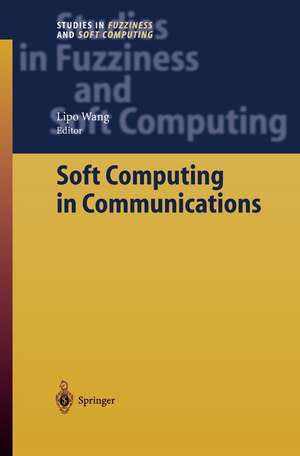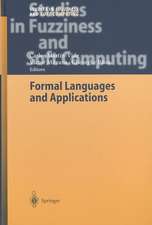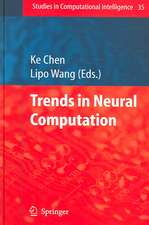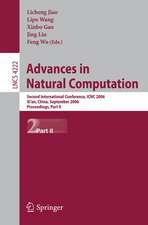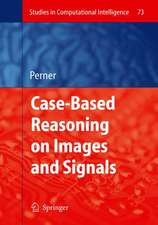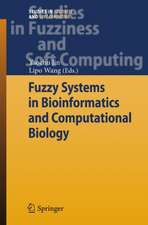Soft Computing in Communications: Studies in Fuzziness and Soft Computing, cartea 136
Editat de Lipo Wangen Limba Engleză Paperback – 20 noi 2013
| Toate formatele și edițiile | Preț | Express |
|---|---|---|
| Paperback (1) | 950.33 lei 6-8 săpt. | |
| Springer Berlin, Heidelberg – 20 noi 2013 | 950.33 lei 6-8 săpt. | |
| Hardback (1) | 956.50 lei 6-8 săpt. | |
| Springer Berlin, Heidelberg – 5 sep 2003 | 956.50 lei 6-8 săpt. |
Din seria Studies in Fuzziness and Soft Computing
- 20%
 Preț: 999.85 lei
Preț: 999.85 lei - 20%
 Preț: 653.06 lei
Preț: 653.06 lei - 20%
 Preț: 872.98 lei
Preț: 872.98 lei - 20%
 Preț: 930.57 lei
Preț: 930.57 lei - 20%
 Preț: 1051.00 lei
Preț: 1051.00 lei - 20%
 Preț: 992.44 lei
Preț: 992.44 lei - 20%
 Preț: 655.85 lei
Preț: 655.85 lei - 20%
 Preț: 1001.86 lei
Preț: 1001.86 lei - 18%
 Preț: 954.14 lei
Preț: 954.14 lei - 20%
 Preț: 330.10 lei
Preț: 330.10 lei - 20%
 Preț: 333.04 lei
Preț: 333.04 lei - 20%
 Preț: 997.56 lei
Preț: 997.56 lei -
 Preț: 391.61 lei
Preț: 391.61 lei - 20%
 Preț: 647.79 lei
Preț: 647.79 lei - 20%
 Preț: 986.01 lei
Preț: 986.01 lei - 18%
 Preț: 958.56 lei
Preț: 958.56 lei - 20%
 Preț: 996.40 lei
Preț: 996.40 lei - 20%
 Preț: 999.35 lei
Preț: 999.35 lei - 15%
 Preț: 646.43 lei
Preț: 646.43 lei - 20%
 Preț: 651.57 lei
Preț: 651.57 lei - 20%
 Preț: 997.89 lei
Preț: 997.89 lei - 15%
 Preț: 641.03 lei
Preț: 641.03 lei - 20%
 Preț: 1009.74 lei
Preț: 1009.74 lei - 20%
 Preț: 992.62 lei
Preț: 992.62 lei -
 Preț: 388.72 lei
Preț: 388.72 lei - 18%
 Preț: 1223.43 lei
Preț: 1223.43 lei - 20%
 Preț: 651.42 lei
Preț: 651.42 lei - 18%
 Preț: 951.59 lei
Preț: 951.59 lei - 18%
 Preț: 948.61 lei
Preț: 948.61 lei
Preț: 950.33 lei
Preț vechi: 1158.95 lei
-18% Nou
Puncte Express: 1425
Preț estimativ în valută:
181.90€ • 197.65$ • 152.90£
181.90€ • 197.65$ • 152.90£
Carte tipărită la comandă
Livrare economică 21 aprilie-05 mai
Preluare comenzi: 021 569.72.76
Specificații
ISBN-13: 9783642536236
ISBN-10: 3642536239
Pagini: 420
Ilustrații: VIII, 408 p.
Dimensiuni: 155 x 235 x 22 mm
Greutate: 0.59 kg
Ediția:2004
Editura: Springer Berlin, Heidelberg
Colecția Springer
Seria Studies in Fuzziness and Soft Computing
Locul publicării:Berlin, Heidelberg, Germany
ISBN-10: 3642536239
Pagini: 420
Ilustrații: VIII, 408 p.
Dimensiuni: 155 x 235 x 22 mm
Greutate: 0.59 kg
Ediția:2004
Editura: Springer Berlin, Heidelberg
Colecția Springer
Seria Studies in Fuzziness and Soft Computing
Locul publicării:Berlin, Heidelberg, Germany
Public țintă
ResearchCuprins
1: Neural Networks.- Neural Approximation of Resource Allocation Functions in Multiservice Access Multiplexers.- Performance of the Multilayer Perceptron-based Decision Feedback Equalizer with Lattice Structure in Non-Linear Channels.- Nonlinear Channel Identification Using Natural Gradient Descent: Application to Modeling and Tracking.- Maximizing Topology Connectivity Using a Hopfield Neural Network.- Binary Neural Network Approaches to Combinatorial Optimization Problems in Communication Networks.- Robust Multiuser Detection Using Artificial Neural Networks.- Minimizing Interference in Cellular Mobile Communications by Optimal Channel Assignment Using Chaotic Simulated Annealing.- 2: Evolutionary Computation.- Orthogonal Genetic Algorithms with Application to Multimedia Multicast Routing ..- Solving the QoS Multicast Routing Problems Using Genetic Algorithms.- Base Station Location Optimization in Cellular Wireless Networks using Heuristic Search Algorithms.- The Synthesis and Design of Communication Antennas Using Genetic Algorithms.- 3: Fuzzy Logic and Neurofuzzy Systems.- QoS Adaptation Based on Fuzzy Theory.- Fuzzy Chaotic Synchronization and Communication — Signal Masking Encryption.- Intelligent Channel Assignment Schemes for Hierarchical Cellular Systems.- A New Mobility Prediction System using Neuro-Fuzzy Model and Its Application to Restoration of Mobility Databases.- Voice Over Wireless LAN Using Intelligent Control.- 4: Kernel Methods.- Least Squares Kernel Methods and Applications.- Least Bit Error Rate Adaptive Multiuser Detection.
Textul de pe ultima copertă
This book is dedicated to recent novel applications of soft computing in communications. It presents the methodologies of neural networks, evolutionary computation, fuzzy logic and neurofuzzy systems, and kernel methods. Applications to the wide field of communications are demonstrated, such as to multiservice access multiplexers, hierarchical cellular systems, multicast routing, optimal channel assignment to cellular mobile communications, transporting voice over a wireless LAN, or the design of communication antennas.
Caracteristici
Presents novel applications of soft computing to telecommunications
